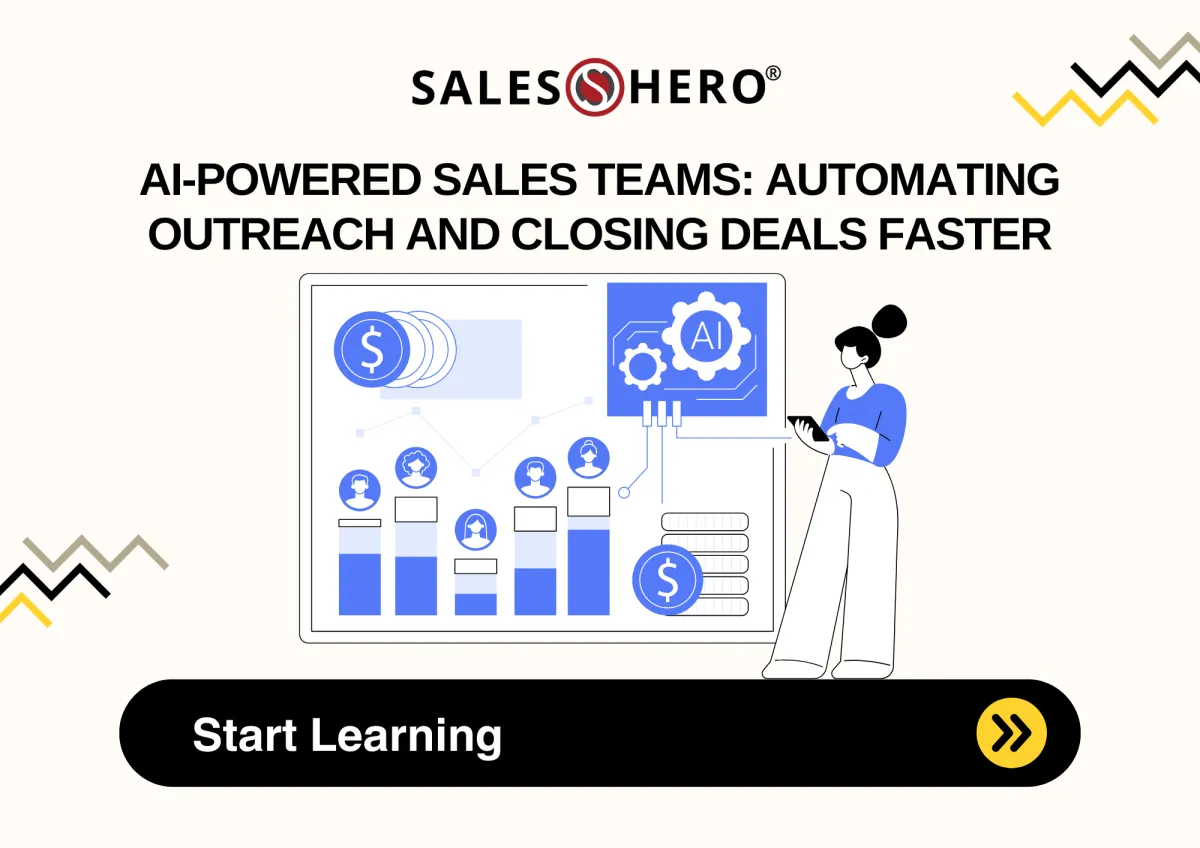
Author: Christopher Yip
Date Published: 29 April 2025
AI-Powered Sales Teams: Automating Outreach and Closing Deals Faster
Artificial intelligence is no longer a futuristic concept reserved for tech giants, it has become an essential driver of competitive advantage for sales teams of all sizes. In Malaysia’s rapidly digitalizing economy, where small and medium enterprises (SMEs) constitute over 97% of all businesses, outdated, manual sales processes can mean missed opportunities and lost revenue. This comprehensive guide explores why AI is the natural next step for modern sales, how traditional models are holding firms back, the concrete ways AI addresses these challenges, and how you can strategically adopt AI using platforms like SalesHeroAI to transform your outreach, prioritize leads, and close deals faster than ever.
Table of Contents
The Evolution of Sales: Why AI Is a Natural Next Step
Sales has always hinged on understanding customers, personal rapport, and the right timing. Yet today’s buyers demand speed, relevance, and seamless engagement. Researching prospects one by one, crafting individualized messages manually, and juggling follow-ups by memory simply can’t keep pace.
Enter AI: a digital co-pilot that augments human capability rather than replacing it. Imagine having instant insights on which prospects are most likely to convert, automated message drafts tailored to each lead’s profile, and smart reminders that ensure no opportunity slips through the cracks. In essence, AI shifts your team from reactive “task execution” toward proactive “opportunity pursuit.”
Did you know?
A recent survey by MDEC and SME Corp Malaysia found that 58% of local SMEs struggle with follow-up consistency, and over 30% lose leads due to manual errors in communication or tracking.
That’s time and revenue slipping away. With AI, your sales team no longer needs to wonder whom to call next or which leads to focus on AI analytics and automation handle the groundwork, so your reps can spend their energy on high-value conversations that build relationships and close deals.
How Traditional Sales Models Hold Businesses Back
Despite rapid digitization in many fronts, many Malaysian sales teams still operate on antiquated models:
1. Manual Lead Qualification
Sales reps sift through spreadsheets or basic CRM lists to decide whom to call or email. This labor-intensive process not only wastes time but also introduces human bias, some prospects get too much attention, while others are overlooked entirely.
2. Generic Outreach Messaging
Crafting personalized emails or messages every time is simply not scalable. As a result, teams resort to one-size-fits-all templates that yield low open and response rates. In fact, generic cold emails average less than 15% open rates in B2B contexts.
In Malaysia’s bilingual, multi-industry environment, these shortcomings are magnified. SMEs may operate in Malay, English, or Mandarin, and without automation they must craft multiple versions of each message. Further, many still rely on Excel rather than purpose-built CRMs, making data errors and lost leads a common refrain.
3. Reactive, Calendar-Based Follow-Ups
Without automated reminders, reps rely on memory or calendar alerts, leading to inconsistent follow-up cadences. Studies show that over 80% of sales opportunities are lost due to inadequate follow-up.
4. Siloed Data and Systems
When sales, marketing, and accounting live in separate systems, reps lack a unified view of customer behavior such as purchase history, outstanding invoices, service requests. This fragmentation prevents truly informed, timely outreach.
5. Limited Performance Visibility
Managers struggle to gauge real-time performance. Which reps are converting best? Which campaigns are generating hot leads? The lag in reporting means missed chances to pivot strategies mid-quarter.
How AI Solves Real Sales Problems
AI-driven platforms address each of these pain points through four core capabilities:
Automated and Personalized Outreach
No more one-size-fits-all emails. AI engines analyze each prospect’s profile such as industry, company size, past interactions, invoice history and generate message drafts that feel hand-crafted include:
• Dynamic Templates: Variables like company name, industry pain points, and product benefits auto-populate for each prospect.
• Language Adaptation: In Malaysia’s diverse market, AI can draft messages in English, Malay, or Mandarin based on customer preference data.
Speak Your Customer's Language with SalesHeroAI
Our AI supports Malaysia’s multilingual market - drafting outreach in English, Bahasa Melayu, Mandarin.
Predictive Lead Scoring and Prioritization
Rather than guessing which leads matter, AI assigns a numerical score based on dozens of signals:
• Behavioral Data: Website visits, content downloads, email engagement.
• Transactional Data: Past purchase amounts, frequency, payment timeliness.
• Firmographics: Company size, sector, revenue growth.
Leads scoring above a defined threshold are automatically flagged as “hot” in your CRM, ensuring reps focus on high-propensity opportunities first. Early adopters find they spend 40% less time qualifying and 50% more time selling.
Automated Follow-Up Cadences
AI-driven sequences ensure consistent, timely touches. When a lead opens an email but doesn’t reply, the system can:
• Wait a pre-set interval (e.g., 48 hours), then send a new message in a different tone.
• If an invoice is overdue, trigger a gentle payment reminder via WhatsApp.
• Route unresponsive leads into a nurture drip sequence with educational content.
This “set-and-forget” approach reduces human error and elevates the overall touch frequency—critical, since studies show that prospects receive 5–8 touches before engaging.
Real-Time Analytics and Coaching
AI tools don’t just automate, they inform. Through dashboards and alerts, managers and reps gain insights like:
• Deal Velocity: Which opportunities are stalling and why.
• Rep Performance: Who’s beating benchmarks on calls, emails, and meetings.
• Message Effectiveness: Which subject lines and content drive the most replies.
Some platforms even offer call- and email-analysis: transcribing conversations, scoring sentiment, and surfacing coaching tips (e.g., “Ask this question to uncover budget concerns”). This continuous feedback loop drives rapid skill development across the team.
Strategic Best Practices for AI Adoption
To maximize ROI and drive lasting change, follow these guiding principles:
1. Executive Sponsorship: Secure a visible sponsor (e.g., Head of Sales or COO) to champion AI projects and allocate budget.
2. Cross-Functional Collaboration: Involve IT, legal, and finance teams early to address data integration and compliance.
3. Change Management: Communicate benefits clearly to your sales force, addressing concerns about “AI replacing jobs” by emphasizing AI as an enabler.
4. Continuous Training: Offer blended learning such as live webinars, on-demand tutorials, and AI-driven “help bots” that answer rep questions 24/7.
5. Performance Feedback Loops: Embed dashboards in daily workflows (e.g., CRM homepages) so reps see real-time impact of AI on their metrics.
6. Iterative Improvement: Treat AI deployment as agile projects - deploy, measure, learn, refine, and redeploy, continuously unlocking new use cases (upsell recommendations, churn prediction).
The Future of AI-Driven Sales in Malaysia
Looking ahead to 2025 and beyond, several trends will define AI-powered selling:
• Voice and Conversational AI: Beyond emails and chatbots, voice assistants (integrated with phones or smart speakers) will handle initial qualification calls, routing only the hottest leads to human reps.
• Augmented Reality (AR) Proposals: Sales teams could use AR to showcase products in a customer’s environment - integration with AI would personalize the demo based on customer data automatically.
• Prescriptive Analytics: AI systems won’t just report what happened, they’ll prescribe the next best actions, such as recommending price adjustments or bundling offers to maximize deal value.
• AI-Coach for Sales Training: Recorded calls and emails will feed into AI coaches that diagnose skill gaps and deliver targeted training modules, accelerating ramp-up for new hires.
• Hyper-Personalized Microsites: Using AI, sales teams will generate personalized mini-websites for each prospect, populated with relevant case studies, ROI calculators, and local testimonials.
Malaysia’s government and industry bodies are also backing this evolution. The Digital Economy Blueprint and grants from MDEC for AI adoption in SMEs will lower barriers to entry. With ongoing investments in 5G networks and data center capacity, latency-sensitive AI applications like real-time sentiment analysis on video calls will become commonplace.
Crucially, local AI startups and system integrators are emerging to customize global platforms for Malaysian market nuances, ensuring solutions like SalesHeroAI stay finely tuned to regional languages, cultural preferences, and business practices.
Conclusion: Embrace AI to Stay Ahead
In an era where buyer expectations outpace traditional sales rhythms, AI-powered sales teams are not just an advantage—they are a necessity. By automating outreach, prioritizing the best leads, and delivering data-driven coaching, AI platforms like SalesAI empower Malaysian businesses of all sizes to close deals faster, boost productivity, and outmaneuver competitors.
Key Takeaways:
✅ AI handles time-consuming tasks (research, message drafting, follow-ups), freeing reps to focus on building relationships.
✅Predictive lead scoring ensures your team invests effort where it matters most.
✅Automated cadences and language adaptation drive higher engagement in Malaysia’s multilingual market.
✅Looking forward, AI innovations in voice, AR, and prescriptive analytics will further redefine sales excellence.
The future of sales in Malaysia belongs to teams that blend human intuition with machine intelligence. Start your journey today: evaluate how SalesAI can integrate into your existing systems, run a pilot to demonstrate impact, and scale up to transform your entire sales organization. In doing so, you will not only keep pace with global trends but lead Malaysia’s own digital sales revolution.
FAQs
What is an AI-powered sales team?
A team using AI to automate tasks like drafting personalized emails, scoring leads, and scheduling follow-ups, so reps focus on selling.
How does AI help in Malaysia?
• Multilingual outreach (English, Malay, Mandarin)
• WhatsApp/SMS automation for 90%+ mobile users
Will AI replace my sales reps?
No. AI handles repetitive work, freeing reps to build relationships. Most teams grow headcount after productivity gains.





